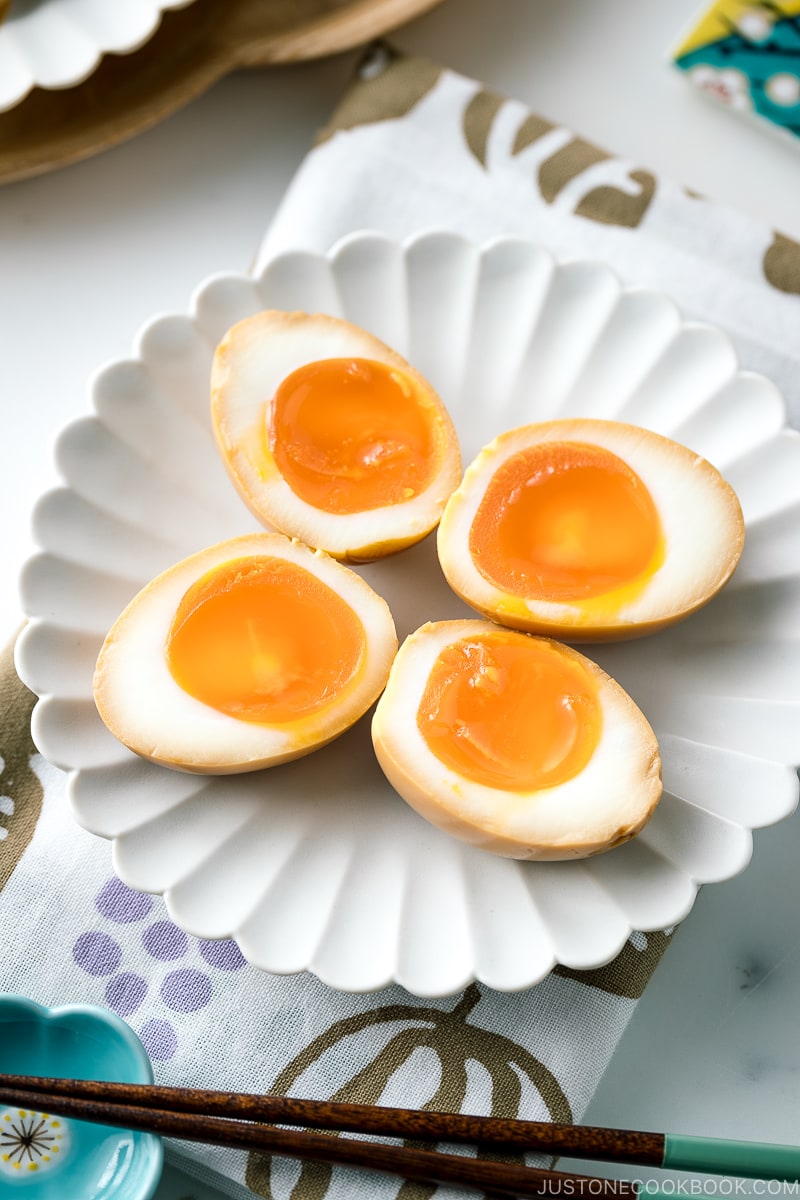
A great bowl of ramen is built upon a few significant components. There’s hot broth, fresh-made noodles, and the toppings. As far as the toppings go, no one can resist a perfectly cooked ramen egg that sits alongside sliced chashu, a sheet of nori, and green onions. Some would even argue that ramen egg is a must!
When done right, ramen egg is creamy, silky, full of umami, and ready to enrich and intensify your ramen enjoyment. The truth is, ramen eggs are not just for ramen alone. You can enjoy these delicious eggs anytime, in many different ways!
What Are Ramen Eggs?
Ramen eggs are Japanese soft-boiled eggs known for their custardy, jammy, runny yolk, and umami flavor. They are marinated overnight in a sweetened soy-based sauce. In Japan, we call these marinated eggs Ajitsuke Tamago (味付け玉子), short for Ajitama (味玉) or Nitamago (煮玉子).
While these eggs are excellent on ramen, they are also fantastic to enjoy as a side dish, snack, or packed in a bento. Don’t limit yourself there! You can even add them to salads or sandwiches. That’s the magic of ramen eggs. They are so good and amazingly versatile.
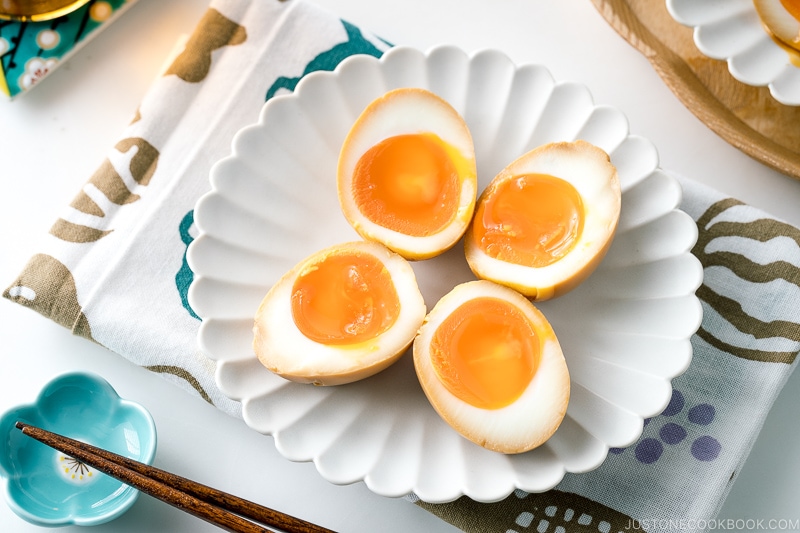
Ingredients for Ajitsuke Tamago
Five ingredients are all you need, and you’ll be surprised at how easy it is to make ramen eggs at home.
- Good quality eggs, especially if you plan to make soft-boiled eggs
- Soy sauce
- Mirin
- Sake (or water)
- Sugar
For the marinade, you can create your version with additions (such as chili flakes for spice, etc), but let’s stick with the basics.
What changed from the 2011 Recipe?
Some of you might be familiar with the original recipe I shared in 2011. In the past, I used water instead of sake. However, for food safety reasons, I started making my ramen eggs with sake and like this version much better.
Why sake? The amino acids in the fermented rice wine enhance food flavors by adding hints of sweetness and umami, which makes the eggs taste better. In case you’re wondering, we would boil off the alcohol from the sake before marinating the eggs so it’s perfectly safe for kids to consume.
As part of the refinement, I also added a bit of sugar. To put the old and new recipes to the test, I had my family try out the two versions multiple times, and they concluded that the winner goes to this updated recipe. For those who can’t consume alcohol, you can still use water.
How To Make the Best Ramen Eggs
You can find the detailed recipe below, but here’s a quick overview.
Jump to Recipe- Make the marinade.
- Cook soft-boiled eggs.
- Marinate the eggs overnight.
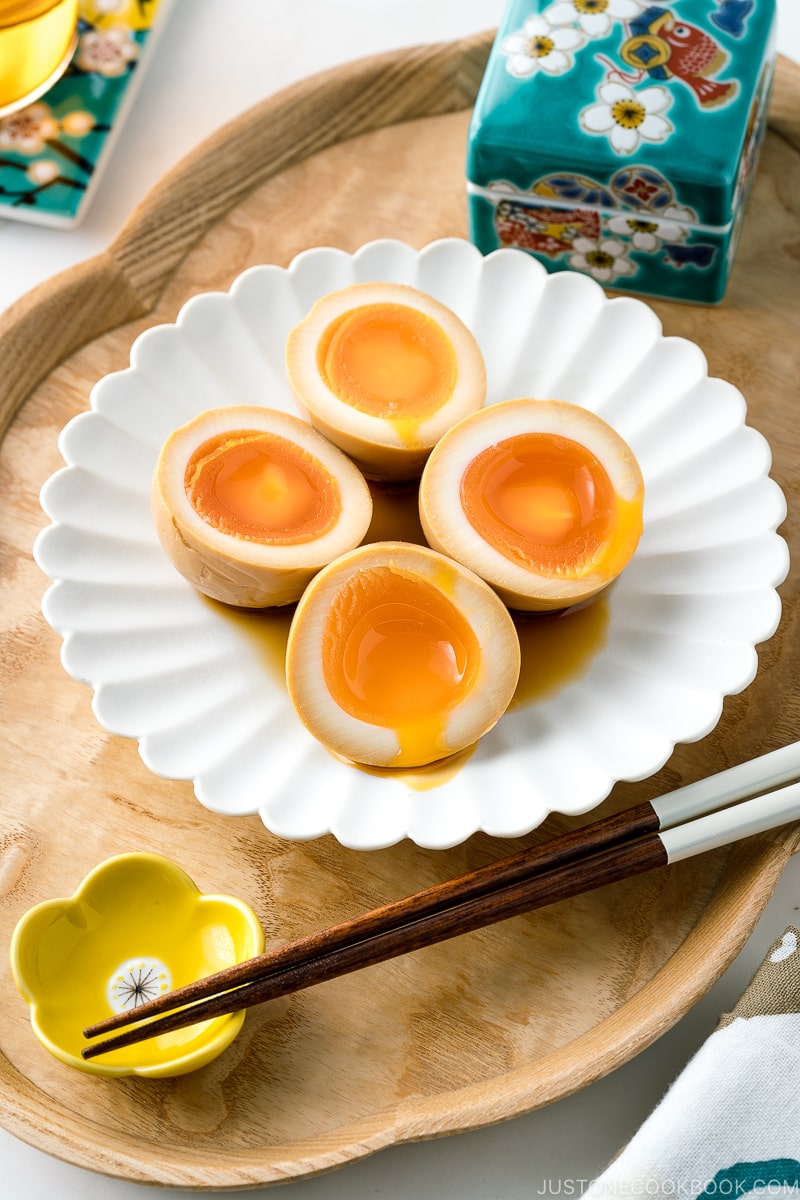
Cooking Tips
Tip #1: Cook the marinade
To make the marinade, I highly recommend cooking it for 1 minute after boiling. This ensures the sugar dissolves and the alcohol evaporates, leaving only the natural umami and sweetness in the sauce.
Tip #2: Use refrigerated eggs
Using a fine-mesh sieve/strainer, gently lower your eggs straight from the fridge into the (already) boiling water and lower the heat slightly to a simmer.
Tip #3: Cook 7 minutes from the first egg in boiling water
Start setting the timer for 7 minutes from the first egg submerged in boiling water. It takes about 30 seconds or less to submerge all four eggs (set the timer for 6 minutes and 30 seconds if you start the timer when you finish submerging all the eggs. Little adjustment matters!)
I use large American eggs for this recipe, and knowing that egg sizes vary in different parts of the world, you might need to adjust the cooking time slightly.
Tip #4: Shock the eggs in ice water
Shock the boiled eggs in ice water immediately and let them chill for at least 15 minutes. I use the same ice water to dip the boiled eggs a few times when peeling them. Water goes into the gap and helps peel easily.
Tip #5: Marinate the eggs overnight
Marinate the ramen eggs for just a few hours or overnight. I can make ramen the next day while the eggs stay marinated in the fridge, waiting for their appearance.
How To Store Ramen Eggs
Soft-boiled eggs should be consumed in 3-4 days. Keep the Ajitsuke Tamago or ramen eggs in the refrigerator at all times. Use a clean utensil to take out a marinated egg, if you continue to marinate the rest of the eggs. I’d take out the ramen eggs after soaking them overnight as I don’t want my eggs to be too salty. You can marinate for up to 2 days at most, but I recommend removing from the marinade after that.
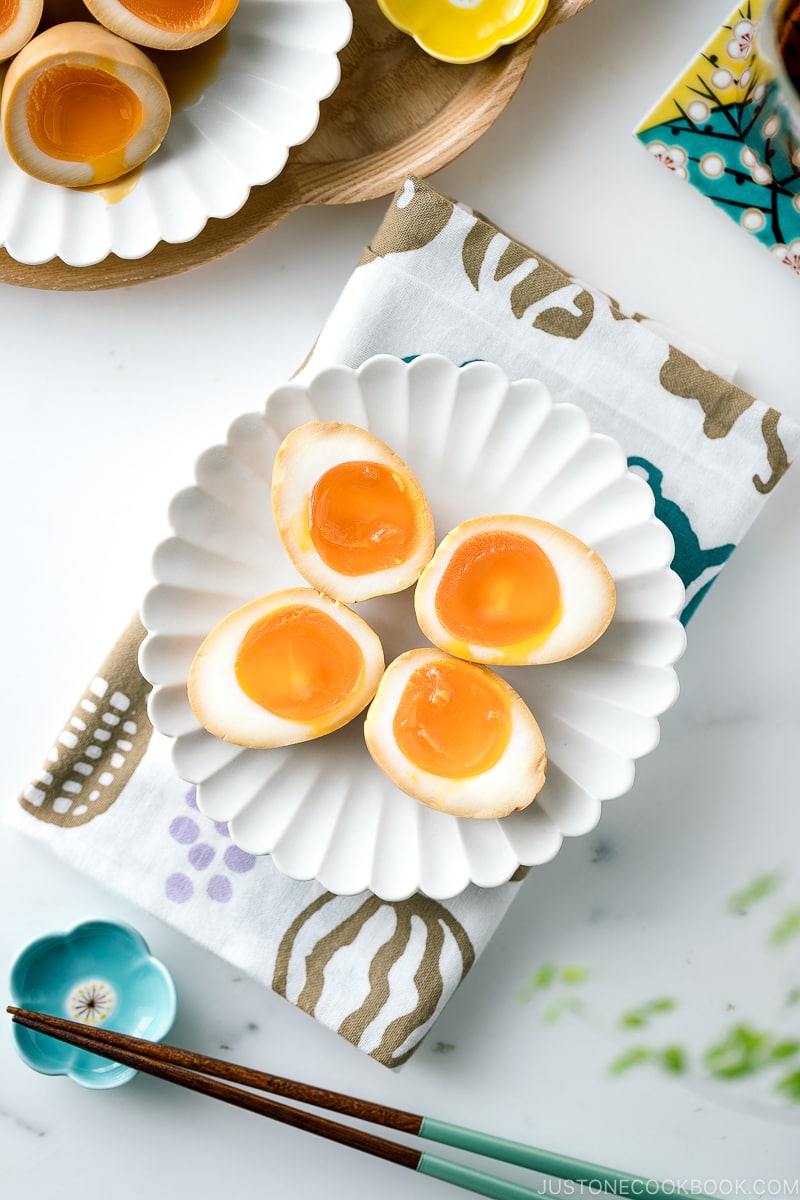
How To Serve Ramen Eggs
I hope you’ll try this recipe because it can make your day better. Here are my absolute favorite ways to enjoy the eggs.
- Serve with Miso Ramen
- Serve with Vegetarian Ramen
- Serve with Tsukemen (Dipping Ramen Noodles)
- Serve on Avocado Toast
- Serve with Japanese Curry
- Pack in Bento Box
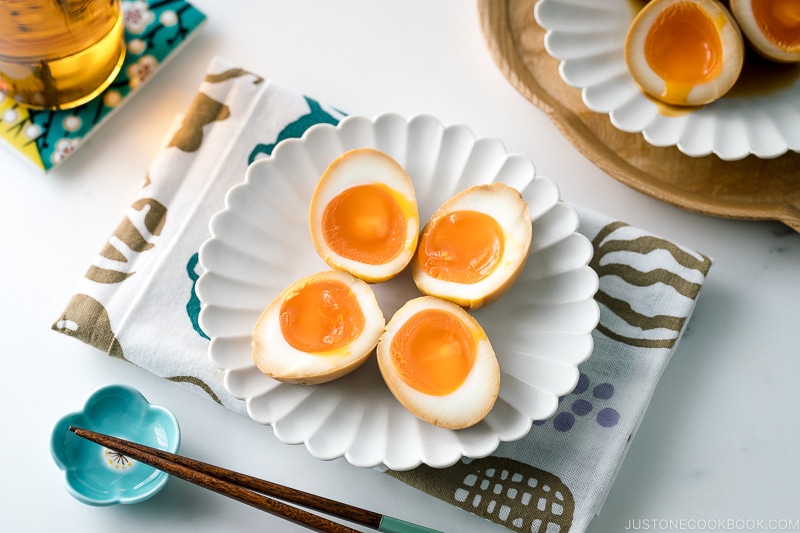
Wish to learn more about Japanese cooking? Sign up for our free newsletter to receive cooking tips & recipe updates! And stay in touch with me on Facebook, Pinterest, YouTube, and Instagram.
Ramen Eggs (Ajitsuke Tamago)
Ingredients
- 4 large eggs (50 g each w/o shell) (refrigerated until ready to boil; slightly older eggs are easier to peel)
Instructions
- Before You Start: Please note that this recipe requires a marination time of 8 hours or overnight. Now, gather all the ingredients.
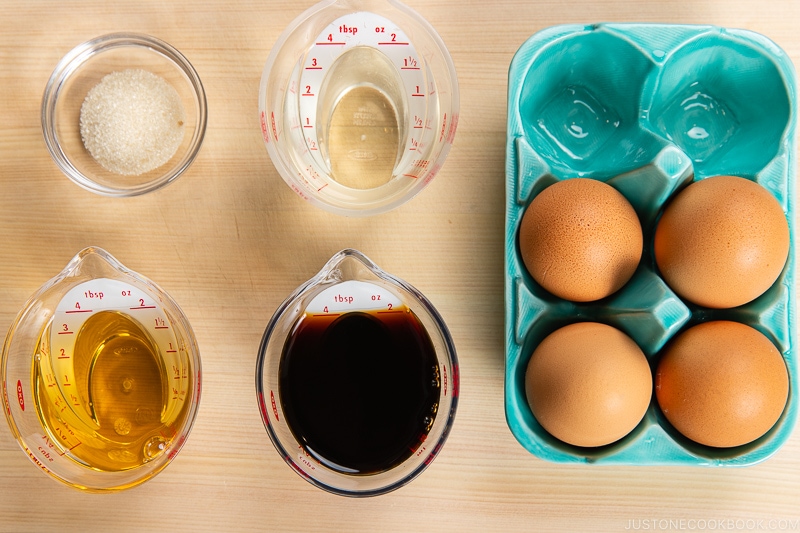
To Make the Marinade
- Combine ¼ cup soy sauce, ¼ cup mirin, ¼ cup sake, and 1 tsp sugar in a small saucepan.
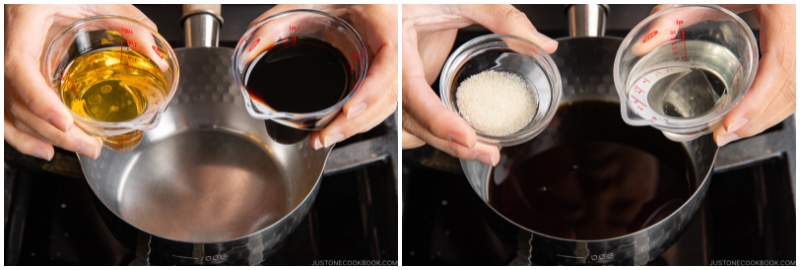
- Bring it to a boil, whisking it to dissolve the sugar completely. Once boiling, lower the heat and simmer for 1 minute. Turn off the heat. Set aside to cool completely.
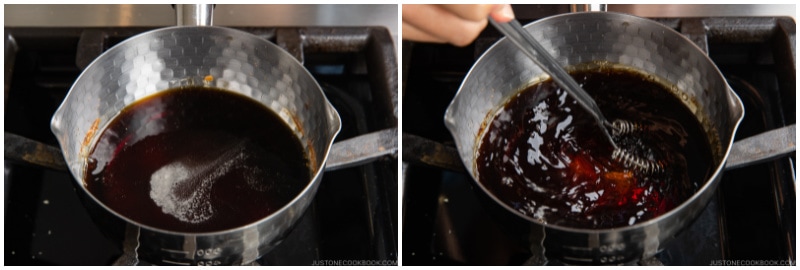
To Cook the Soft-Boiled Eggs
- Bring 4 cups (1L) water to a full boil in a saucepan. Make sure there's plenty of water—enough to cover by 1 inch (2.5 cm) once you add the eggs. Once it's boiling, remove 4 large eggs (50 g each w/o shell) from the fridge and use a strainer or ladle to gently lower one egg at a time into the boiling water. Set a timer for 7 minutes after you add the first egg. Nami's Tip: Optionally, you can cook them 6–6½ minutes for a runny egg yolk and 8–9 minutes for a custard-like egg yolk.
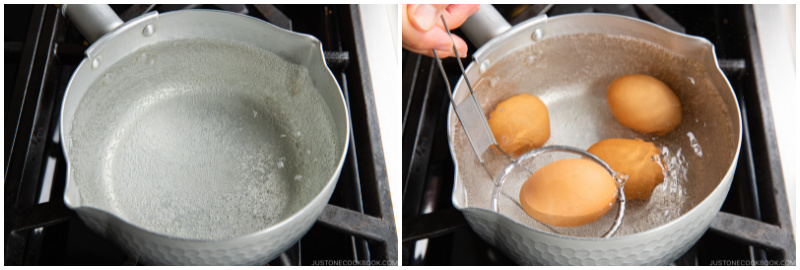
- Maintain a gentle boil. Keep the water simmering but not bubbling so strong that the eggs bounce around. Nami's Tip: During the first 3 minutes, you can gently rotate the eggs with chopsticks to keep the egg yolks centered.
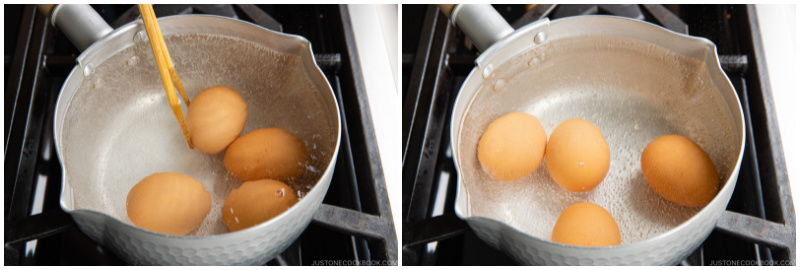
- After 7 minutes, promptly remove the eggs and shock them in a bowl of iced water. Cool for 15 minutes.
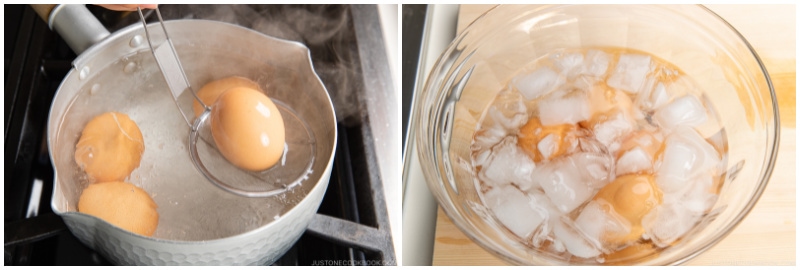
To Marinate the Eggs
- Once completely cooled, gently crack the shell at the wide bottom end and start peeling it vertically toward the pointy top. Dip the egg in the iced water a few times to help with peeling. Nami's Tip: Once you peel one section vertically, the rest of the shell comes off easily.
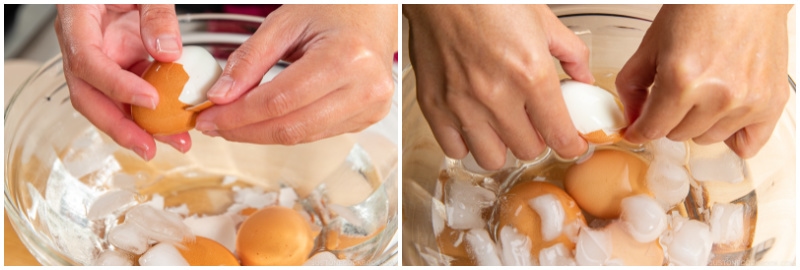
- Place the peeled eggs and marinade in a plastic bag. Why do I recommend a plastic bag? It allows us to use less marinade to keep the eggs submerged. We use this marinade only once for food safety reasons, so it’s most economical to prepare no more than what you need. If you use a container instead of a bag, it requires more marinade to submerge the eggs.
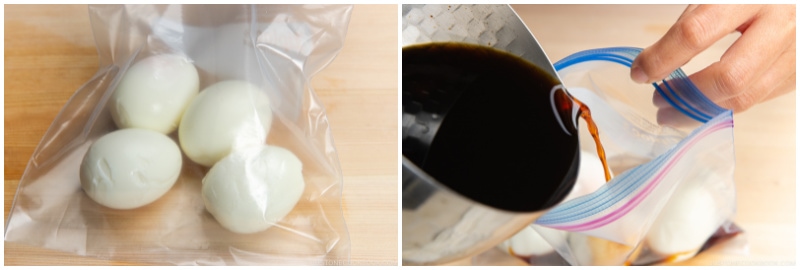
- Remove the air from the bag and use a clip or rubber band to seal it right above the eggs to keep them completely covered in marinade. Refrigerate for 8 hours or overnight. You can rotate the eggs occasionally if you like.
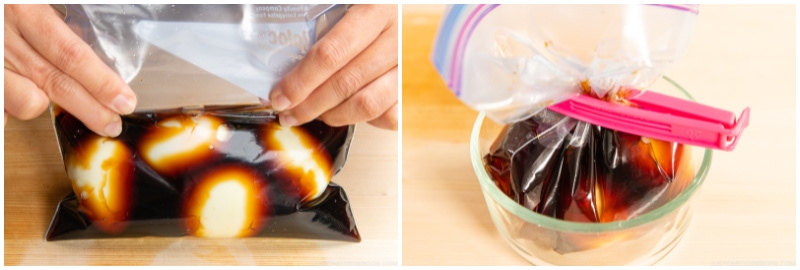
To Serve
- Remove the eggs from the marinade and cut them in half lengthwise. You can use a piece of string, fishing line, or cheese cutter (that‘s what I used here) to cut the eggs in half cleanly. Enjoy these Ramen Eggs in bento, as a ramen topping, or as a snack sliced in half and sprinkled with furikake (rice seasonings) and shichimi togarashi (Japanese seven spice). If you want to warm them, soak the bag in warm water to bring up the temperature faster.
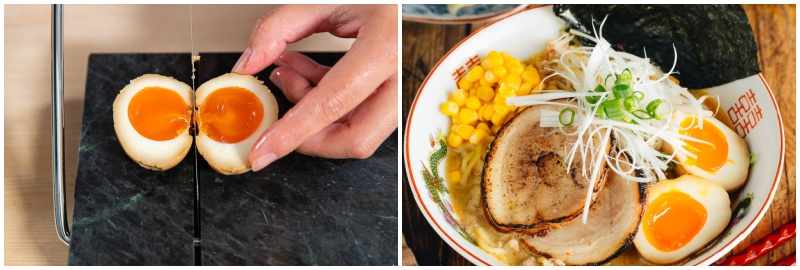
To Store
- Keep them refrigerated at all times. Do not freeze as their texture changes when frozen. They will get saltier the longer they marinate, so remove them from the marinade after 12–24 hours. Enjoy within 3–4 days if your eggs are soft-boiled and within a week if hard-boiled. For food safety reasons, I do not recommend reusing this marinade with new boiled eggs. You can repurpose this marinade as a seasoning sauce cooked with your stir-fried or simmered dishes, but use it soon.
Notes
Nutrition
Did you make this recipe?
Tag @justonecookbook on Instagram so we can see your delicious creation!
Editor’s Note: This post was originally published on September 14, 2014. It has been updated with new images, video, and blog content in September 2021.




